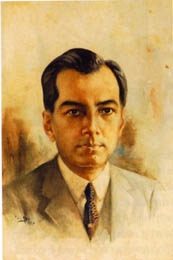My previous engagement I received a large delegation of men and women headed by Commissioner Fabella and Mrs. Perez. Secretary Vargas told me that it was a committee of employees that sought this interview and I told Vargas that I would only receive a small committee of three or five at most. Upon seeing this large delegation, I reprimanded Vargas in the presence of the crowd for permitting that large delegation to come. Without permitting anybody to sit down, I asked them what they wanted and one of the fellows said that they came in the name of the people. I interrupted him at once and said “before you go any further I want you to tell me why do you think that you can speak in the name of of the Filipino people”. The man was startled and I proceeded. “This habit of speaking in the name of the people that we have here in the Philippines is getting into my nerves. Why do you think you can speak in the name of the Filipino people, how many are there in your organization? Even if you had one million, didn’t you know that we have fifteen million in the Philippines? Just see how ridiculous this assumption of speaking for the people is. De la Fuente one day takes the platform and speaks in behalf of the people and asks for something that should be done. The following day Fugoso takes the same platform and also in the name of the people asks just the opposite or says the contrary of what De la Fuente said. Now, just tell me what are the organizations that you represent here. They told me what the organizations were and at this time, having recovered my equanimity, I asked them to sit down and discuss with them the different petitions that they presented. I noticed at once their suggestion that the School Tax be not enforced. I explained to them that this was at the option of the municipal councils and that its enforcement would promote the interest of education to the extent that it would give every boy and girl of the poor opportunity to at least finish their intermediate school. That if the tax was not enforced the only people that would be benefited would be those who could be the tax. After a more detailed explanation of what the effect of the school tax would be, they realized that they were wrong in petitioning the government to postpone the enforcement of the school tax. In this connection, I told them that I was considering recommending to the National Assembly the enactment of a law which would make everybody pay a personal tax exempting only those who wanted to work but had no employment and during the time that they did not have the employment only. I told them that my idea was not to collect the same amount of tax from everybody but to classify in proportion to the ability of the man to pay. They agreed with me. Then I told them that the solution to the sole problem that we have in the Philippines will not be found in the increase of wages, in the increase of the amount spent in public works or buildings, in the creation of new industries or in the development of the natural resources. But first of all we should inculcate in the people, love of work; that in the Philippines nobody works, that those who do work don’t work as much as they should. That I do not place the blame particularly in the present generation of the Philippines because for centuries we had so little necessities that we could satisfy these necessities with little effort. And hence our ancestors lived most of the time working only a few months a year or two or three hours a day. But now we have learned to want for more things an we want to satisfy our necessities but without working more, the result being a great unbalance between the consumption and production of wealth. I told them that their petition for increase of wages when at present there is already a large number of unemployed because industries which cannot pay those wages will have to close. I told them also that one of the problems that the country faces is the monopoly of the retail trade by the Chinese and that in was inconceivable that a country like the Philippines with so many ideal people would permit foreigners to monopolize an activity which could be done by the natives also. At the end of the conference, the blind men who were dressed in fine khaki suits asked me to let them speak for they have something to present also. I did. One of them, in a fine language, said to me that they wanted to be permitted to beg publicly and in the street. I asked Mrs. Perez what we were doing for the blind and she said that they give them house rent, food for their children, and fifteen centavos a day besides for every member of the family in cash for their necessities. The blind man denied this and said that unless they could beg that they would not be able to live well. Mrs. Perez told me that these fellows even rent girls who accompany them in begging to make the people believe that they are their daughters and these girls are paid twenty five centavos a day. Well, I dismissed the proposition telling the man that this was a matter for the police and that if they beg and the police them they will have to go to jail and that I was not going to intervene.
Aboard the Casiana
Jan. 5, 1938
